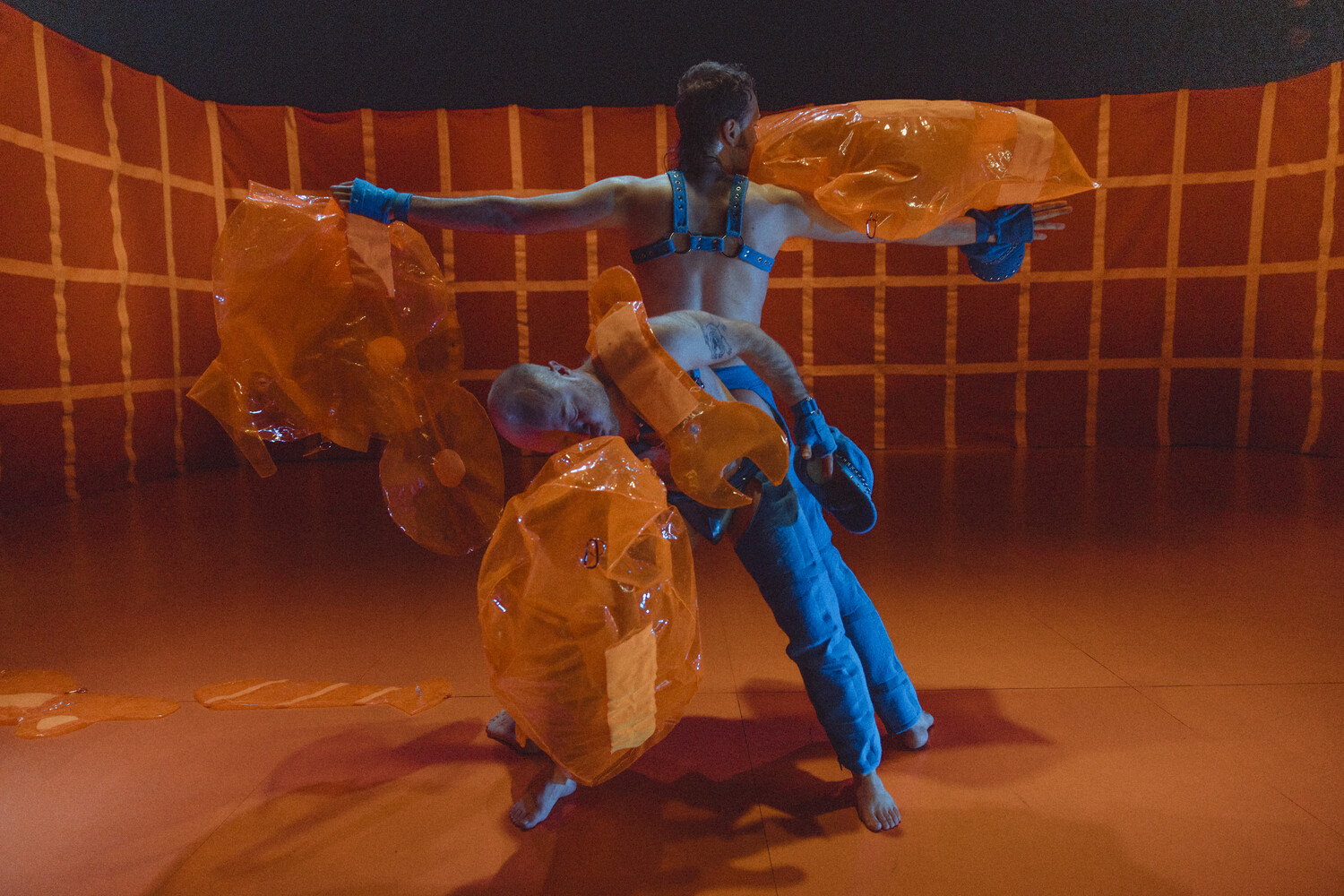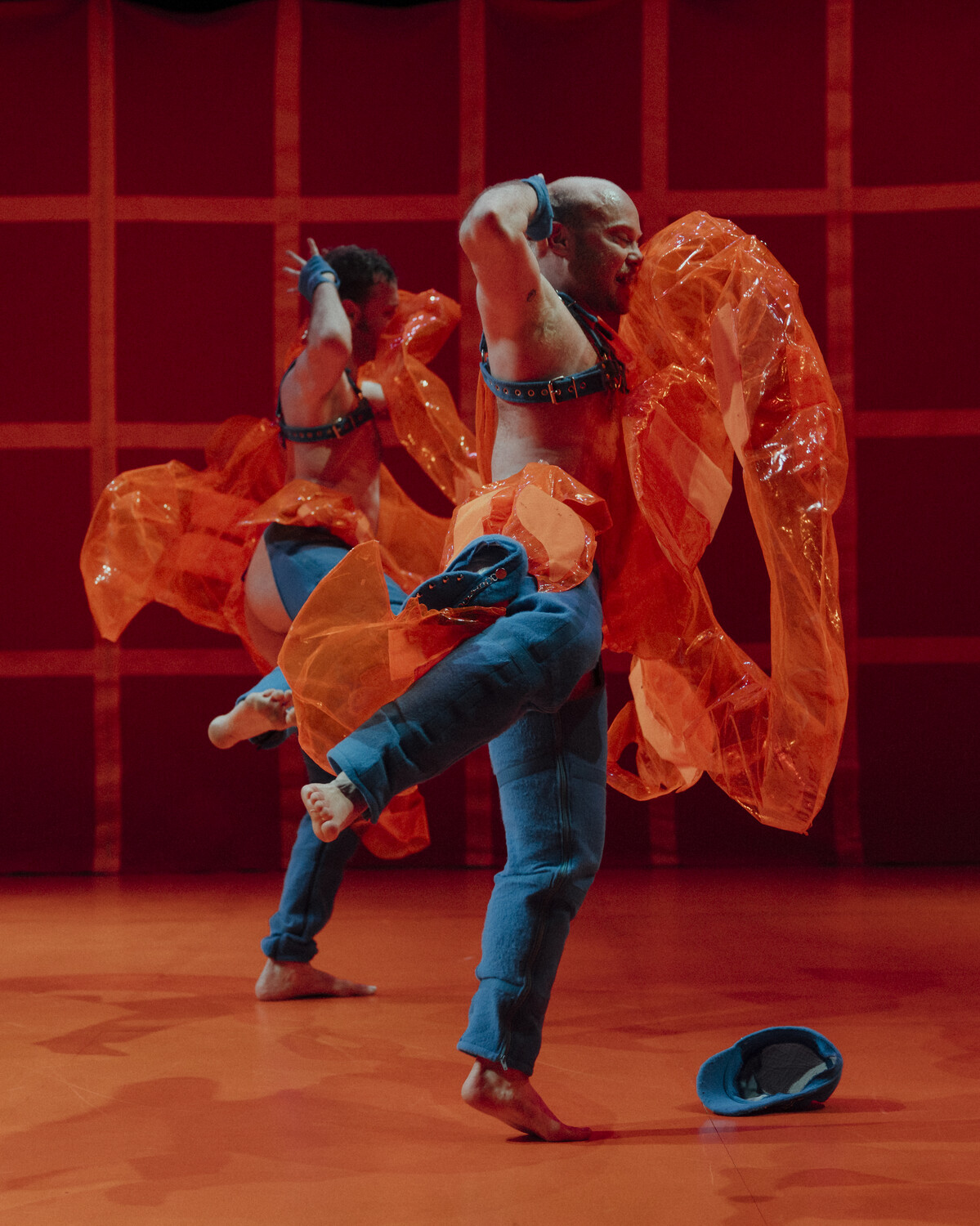Sex, Grief, & Velcro
The relentless labor of DADS
Sex, Grief, & Velcro
The relentless labor of DADS

Drama Tops have made a name for themselves in both Seattle’s queer nightlife and concert dance worlds. The duo, Elby Brosch and Shane Donohue, are true crossover champions—bringing contemporary performance methodologies to their bar gigs and a fair amount of ass cheek and camp to their “more serious” stage work. That blend remains true for DADS, their third evening-length work, but of everything I’ve seen from the comedically-driven Drama Tops, this show is decidedly darker.
Produced by Washington Ensemble Theater at 12th Ave. Arts through May 10, DADS explores all themes relating to the titular idea—including leather daddies, masculine roles, being a dad in queer community, and their actual fathers. The idea of “dad” is a weighty subject for many, and it seems to be for Brosch and Donohue too as they grapple, hold on, and endure their way through this show.
The bold set (Brosch and Donohue) works in coordination with costumes (Siobhan Teahan) and props (Lilia Deering) to become an antagonistic environment the duo must contend with throughout. A matrix of orange grid lines on red surround the stage, framing two blue leather-daddy ensembles. Disembodied chaps, cap, harness, and gloves stick to the wall as if their invisible wearer were caught mid-action in a giant net. It is only when Drama Tops appear and peel their outfits from the back wall that we learn everything is Velcro.
At first all is well. The duo race to don their daddy outfits, and as if by magic finish at precisely the same time. They strike performative and statuesque poses, but the positions are unstable, crumbling under their own weight. Soon this gives way to rhythmic wobbling: pulsing to an invisible beat that they cannot break from. Without ever ceasing their movements, they proceed to blow up a procession of oversized, orange vinyl inflatables while simultaneously enacting an ever-shifting tableau of suggested sex acts. A bobbing head emerges between a pair of legs, blowing gasps of air into an inflatable with rhythmic desperation. Bodies swivel to a formation of pelvis pumping. With each puff of breath, the blow up’s shape is revealed—a wrench, a motorcycle—the typical icons of masculinity that might grace a Father’s Day greeting card. Then there’s a coffin.
Brosch has made no secret of the fact that this piece deals with the loss of his father to cancer, when Brosch was just 15. A coffin popping up, mid-hump and offered without context, is a subtle nod to the way grief often arrives unannounced, years after the fact, and a perfect example of how Drama Tops uses imagery to layer poignant meaning throughout the show. As they complete each blow up, Donohue and Brosch stick the inflatables onto their Velcro costumes, the tropes of manliness turned to literal baggage. At one point in the performance, a pair of giant, inflatable handcuffs stuck criss-crossed to the Velcro wall suddenly seem a lot like a cage.

There is a curious lack of intimacy and pleasure throughout the parade of sex acts. The sex is representative: It is not sex between these two people, not sex occurring across a single evening, but seemingly an abstraction of years' or a lifetime worth of engagements abstracted into one durational expression carried out across the stage, set to music that sounds like a train continuously slamming the breaks without ever reaching its inevitable crash. This prolonged segment of the performance is as anti-climactic as the music. Eventually the soundscape fades and Brosch simply stops, walks to the theater's in-house bar, and casually asks a still-puffing Donohue if he'd like a shot. Donohue exhaustedly trots over. We could be in the club, except the sudden eerie silence of the moment lays bare a kind of defeat. At the end of all of this, just a pragmatic going-through-the-motions of having a good time.
Aside from all the dad/daddy references, the underlying theme of DADS is exertion. It would be hard to overstate how physically demanding the piece is. Drama Tops’ style of dare-devil partnering—swinging one another by the ankles, flipping each other like WWE wrestlers—would be impressive enough, but it's the endurance of it all that really hits for the viewer. Even the upbeat moments of camp are relentless, as if these two were compelled by something beyond their control to complete the specific tasks that push their bodies to their very edge, while apparent frustration and exhaustion mount. Moments of humor emerge inside this durational effort, but everything is so desolate, it’s hard to summon a laugh. That's not to say the jokes aren’t well-executed, but in this sea of struggle the humor feels like one more thing they are compelled to do: On top of their Sisyphean tasks, they must entertain as well.
In the end, it's the caretaking that Brosch and Donohue perform for each other that proves the relief, the one thing that is for them. Checking in with each other by name, asking what each other needs. They pause and come to an agreement when it’s time to move on to each next section. In such moments, the rapport between the two performers is tender, responsive, and real. In the midst of a heavy, almost brutal show, where the weight of grief and perhaps existential crisis is made extremely tangible, they make it through because they have each other.
“This show is hard,” Drama Tops state in their program note.
It is, but it is also full of surprises (which I won’t give away here), intention, and a lot of heart. DADS is an ambitious show that invites us to be present with Drama Tops as they go into their deep, dark truths. It is rare that art gives us something that feels this real.
See DADS at 12th Avenue Arts through May 10. Buy tickets here.
Kaitlin McCarthy is a dance artist, journalist, and teacher based in Seattle, WA. She is the Editor of SeattleDances and makes strange performances with collaborator Jenny Peterson as The Bonnies.